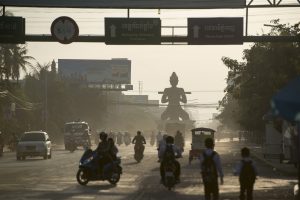On July 28, the International Finance Corporation (IFC), the private sector investment arm of the World Bank Group, is set to decide whether to empower its own accountability and oversight mechanism, or to undermine the mechanism’s credibility in the pursuit of predatory profits.
The IFC’s independent watchdog, the Compliance Advisor Ombudsman (CAO), was established to monitor the bank’s billions of dollars of investments across the globe, and to assess whether those investments adhere to the IFC’s environmental and social standards.
For the last 16 months, a complaint filed by our organizations on behalf of Cambodian microfinance borrowers has been winding its way through the CAO process. The complaint concerns Cambodian borrowers who have been forced to sell their land, driven to unsafe migration, forced to sell culturally significant land belonging to Indigenous people, put children to work in order to make loan repayments, and suffered a number of other harms due to predatory lending.
These abuses clearly run afoul of the policies and standards of the IFC, which has invested hundreds of millions of dollars in Cambodian microloan providers over the years. The CAO has undergone a painstakingly detailed assessment of this complaint’s eligibility to determine whether there are “preliminary indications of harms” that are linked to IFC’s failure to follow its own policies in Cambodia’s microfinance sector.
But a recent development in the case has raised questions over the IFC’s commitment to accountability.
Last month, the CAO announced its decision that a full compliance investigation is warranted. But instead of moving forward with its work, the CAO has been stymied by an unprecedented and dangerous objection from IFC management. Using an untested process established in 2021, IFC management is now asking the IFC Board of Directors to reverse the CAO’s decision.
The Board must vote and make a decision by July 28. The consequences of the vote will extend far beyond Cambodia, potentially determining if the CAO can be overruled by the whims of the IFC.
So how did we get to this point?
It’s a well-established fact that Cambodia’s $14 billion microfinance sector has had deleterious effects on many of the 2.8 million households with loans. In addition to four reports over four years from local human rights NGOs, the United Nations has repeatedly raised concerns; the German government funded a study in 2022 that found 167,000 debt-driven land sales; and dozens of journalists and academics have documented the intimidation, coercion, and pressure that Cambodia’s poorest citizens have come under to repay massive debts from these highly profitable financial institutions.
This should make it a fairly straightforward case for the CAO to take on. IFC investments in Cambodian loan providers led to social harms, and those who suffered submitted complaints to the CAO’s offices, which determined that an investigation is merited. But instead of a smooth process, IFC management is using the 2021 policy to challenge the CAO’s investigation.
The 2021 policy is meant to allow the Board to ensure that the CAO assessed the case. It does not allow the Board to substitute its own assessment for that of the CAO. The policy only allows the Board to review a handful of technical, procedural criteria, and is to be used only in “exceptional circumstances.” It is not meant to be used by the IFC to slow or overturn CAO decisions with which it disagrees, and it expressly prohibits the Board from “making a judgement on the merits of the complaint,” or even to discuss “matters that require the exercise of discretion” by the CAO’s director-general, such as whether an investigation is warranted.
If the IFC Board decides to overturn the CAO’s decision in this case, it would open the floodgates for the IFC to undermine the CAO in cases across the globe. That’s why 24 organizations from across the world signed onto a joint letter this month calling on the IFC Board to empower the CAO and allow it to do its job free from interference. A failure to do so would set a dangerous precedent, effectively excluding millions of microfinance borrowers from raising their concerns about IFC investments to the IFC’s internal accountability mechanism.
This week’s decision is important for Cambodian microloan borrowers and for the IFC. The disappointing attempt by IFC management to skirt scrutiny over its microfinance investments is embarrassing, but the IFC Board can still act to ensure that the CAO remains a credible and empowered accountability mechanism by voting to affirm the CAO’s decision to investigate. Such a vote would help maintain the IFC and CAO’s credibility, and would be a further step toward addressing the abuses suffered by Cambodian microfinance borrowers.

































